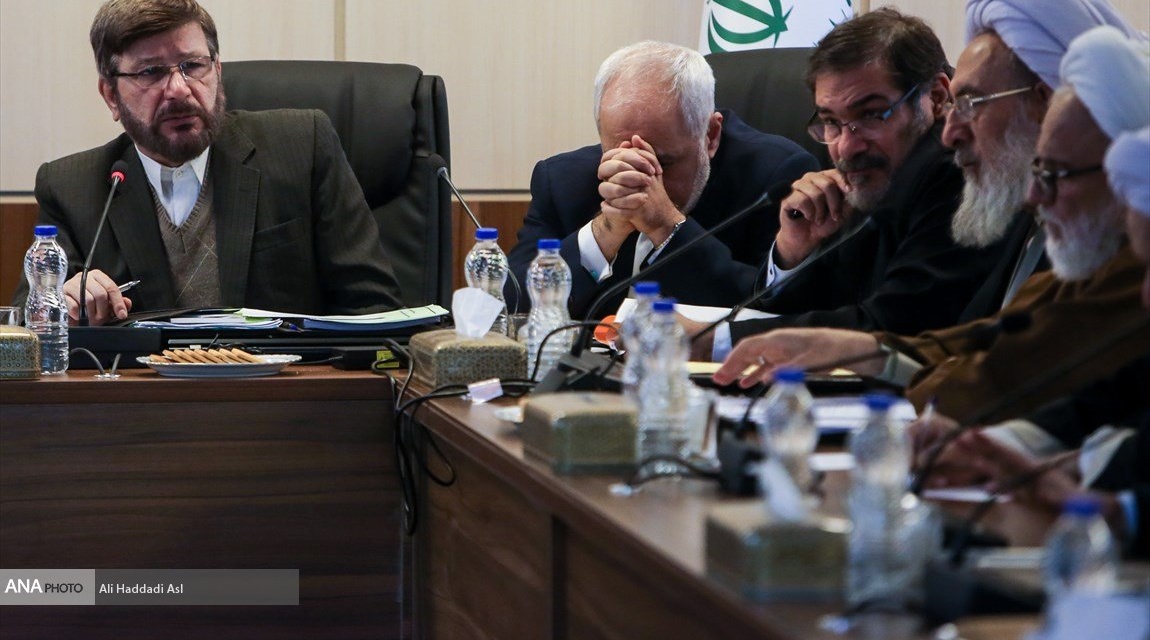Iranian Foreign Minister Mohammad Javad Zarif bows his head during a recent meeting of the Expediency Council
UPDATE 0930 GMT:
Foreign Minister Mohammad Javad Zarif has indicated that his resignation is a bid for the Foreign Ministry to regain influence in Iranian policy and decision-making.
Zarif said he hoped his sudden decision would be a ‘nudge’ to return the Ministry to its rightful place in foreign relations.
The Ministry has been eclipsed during the Rouhani Government by entities such as the Revolutionary Guards, with the Supreme Leader taking key areas such as the Middle East away from Zarif (see below).
In a sign of the relative power of the groups, Gen. Qassem Soleimani, the commander of the Quds Force of the Guards, was present at Monday’s meeting between Ayatollah Khamenei and visiting Syrian leader Bashar al-Assad, from which Zarif was absent.
Ayatollah Khamenei has yet to respond to Zarif’s message.
Responding to calls from his staff to rescind the resignation — and statements that they would also leave — Zarif said, “My request for dear colleagues at the foreign ministry is that they follow up their duties in defense of the country with all strength, and strictly avoid taking such measures.”
UPDATE 0830 GMT:
In a televised speech, President Hassan Rouhani has tried to convince Foreign Minister Mohammad Javad Zarif to stay.
Rouhani said, “Today our frontline against the US, is the Foreign Ministry, the Central Bank, and the Oil Ministry. I thank Dr Zarif, the Cental Bank Governor, and the Oil Minister for their resistance.”
#Iran's president, trying to appease FM @JZarif, says that #Syria's president Bashar al-Assad also thanked Iranian foreign Ministry during his trip to Tehran yesterday on Monday. pic.twitter.com/9bWh809jtw
— Abas Aslani (@AbasAslani) February 26, 2019
Rouhani also signalled to Zarif that Iran might finally accede to the Financial Action Task Force and an international convention against terrorism, after months of delay and regime in-fighting.
The Government has proposing accession as part of ensuring vital links to prop up the Iranian economy. But Rouhani and Zarif have been blocked by hardliners who fear that Iran’s ties with groups such as Lebanon’s Hezbollah and Palestine’s Islamic Jihad and Hamas will be affected.
Iran Daily, Feb 17: Tehran Again Defies Europe and Economic Problems
Rouhani said, “The Supreme Leader told me several times that he does not oppose the four bills [for accession to the FATF].”
Iranian politics — and many Iranians — have been unsettled by the resignation of Foreign Minister Mohammad Javad Zarif.
Zarif, who played an essential role in reaching Iran’s 2015 nuclear deal with the 5+1 Powers, unexpectedly announced his departure on Monday via his Instagram account. After greetings for Mother’s Day and International Women’s Day, he wrote:
Many thanks for the generosity of the dear and brave people of Iran and its authorities in the last 67 months. I sincerely apologize for the inability to continue serving and all the shortcomings during my service. Be happy and upbeat.

Zarif had been in the post since the inauguration of President Hassan Rouhani in August 2013. He was seen as a centrist and was often criticized by hardliners for being too “soft” towards the US.
In recent months, the Foreign Minister’s line and rhetoric hardened as the Trump Administration withdrew from the nuclear agreement and imposed comprehensive sanctions, and as Iran continued its essential intervention to prop up Syria’s Assad regime, despite Tehran’s troubled economy.
But some hardliners continued to press for Zarif’s departure, threatening his impeachment.
Zarif gave no specific reason for his resignation, but some observers noted that the Foreign Minister was not present during Syrian leader Bashar al-Assad’s visit to Tehran on Monday, including meetings with Supreme Leader and with Rouhani.
#Iran’s FM @JZarif is quoted by news website Entekhab on the reason of his resignation as saying “after the pictures of the meetings today [with Syrian president], Javad Zarif has no credibility in the world as a foreign minister.”
Zarif was not present in the meetings.— Abas Aslani (@AbasAslani) February 25, 2019
While allowing the Rouhani Government to pursue the nuclear deal, the Supreme Leader drew a firm line in June 2014 on his direction of foreign policy, particularly in the Middle East. The command, initially blocking President Rouhani’s cooperation with the US in the campaign against the Islamic State in Iraq, ensured Zarif had no significant role in Iranian approaches to the Syrian conflict, Yemen’s civil war, and links with Lebanon’s Hezbollah and Palestine’s Islamic Jihad and Hamas.
Zarif’s Instagram post surprised his Foreign Ministry staff and government officials, according to “a person familiar with the events”. Late-night phone calls and negotiations tried to persuade Zarif to reconsider his position, with officials telling Zarif that his exclusion from meetings with Assad was not intentional but an outcome of bureaucratic mismanagement.
The inside source said Zarif was unmoved.
Officially, Rouhani’s office was guarded about yesterday’s development, saying the President has not yet accepted the resignation. Some MPs and politicians urged rejection, saying Zarif’s departure will not serve national interests and will empower hardliners.
Journalist Farnaz Fassihi summarizes:
Update from #Iran on #Zarif resignation:
Panic sets in
1. Rouhani sent a team to Zarif's house to persuade him to stay.
3. #Tehran stock market plunges in first hours of opening.
4. Diplomats threaten resignation.
5. 150 lawmakers write letter to Rouhani to not accept resignation— Farnaz Fassihi (@farnazfassihi) February 26, 2019


Zarif was always irrelevant to mullah’s foreign policy, he is just realizing that? Next he’ll be declared “spy” and plenty of those ended up on a table in the morgue. If he is nearly as smart as he think he is he’ll run.